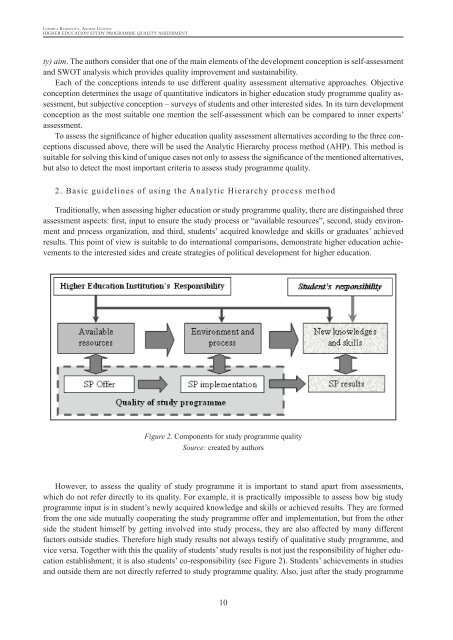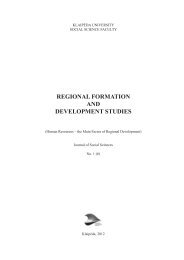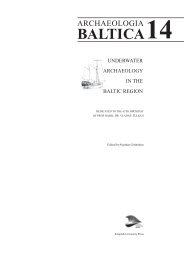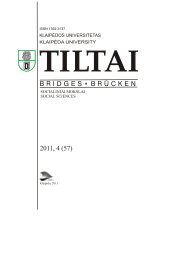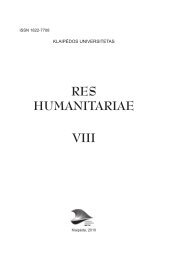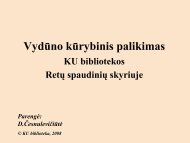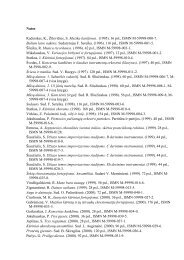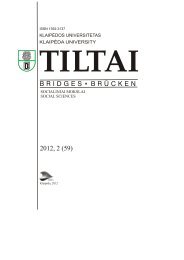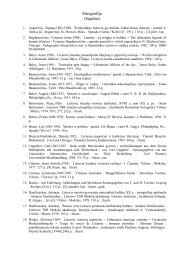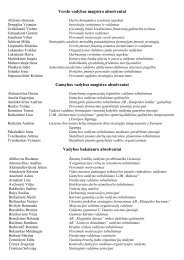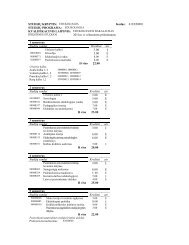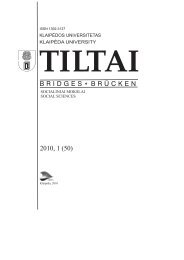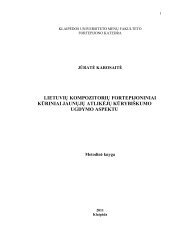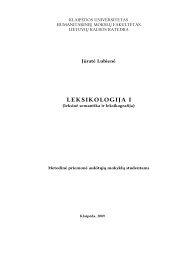regional formation and development studies - KlaipÄdos universitetas
regional formation and development studies - KlaipÄdos universitetas
regional formation and development studies - KlaipÄdos universitetas
Create successful ePaper yourself
Turn your PDF publications into a flip-book with our unique Google optimized e-Paper software.
Ludmila B<strong>and</strong>eviča, Agnese Līgotne<br />
HIGHER EDUCATION STUDY PROGRAMME QUALITY ASSESSMENT<br />
ty) aim. The authors consider that one of the main elements of the <strong>development</strong> conception is self-assessment<br />
<strong>and</strong> SWOT analysis which provides quality improvement <strong>and</strong> sustainability.<br />
Each of the conceptions intends to use different quality assessment alternative approaches. Objective<br />
conception determines the usage of quantitative indicators in higher education study programme quality assessment,<br />
but subjective conception – surveys of students <strong>and</strong> other interested sides. In its turn <strong>development</strong><br />
conception as the most suitable one mention the self-assessment which can be compared to inner experts’<br />
assessment.<br />
To assess the significance of higher education quality assessment alternatives according to the three conceptions<br />
discussed above, there will be used the Analytic Hierarchy process method (AHP). This method is<br />
suitable for solving this kind of unique cases not only to assess the significance of the mentioned alternatives,<br />
but also to detect the most important criteria to assess study programme quality.<br />
2. Basic guidelines of using the Analytic Hierarchy process method<br />
Traditionally, when assessing higher education or study programme quality, there are distinguished three<br />
assessment aspects: first, input to ensure the study process or “available resources”, second, study environment<br />
<strong>and</strong> process organization, <strong>and</strong> third, students’ acquired knowledge <strong>and</strong> skills or graduates’ achieved<br />
results. This point of view is suitable to do international comparisons, demonstrate higher education achievements<br />
to the interested sides <strong>and</strong> create strategies of political <strong>development</strong> for higher education.<br />
Figure 2. Components for study programme quality<br />
Source: created by authors<br />
However, to assess the quality of study programme it is important to st<strong>and</strong> apart from assessments,<br />
which do not refer directly to its quality. For example, it is practically impossible to assess how big study<br />
programme input is in student’s newly acquired knowledge <strong>and</strong> skills or achieved results. They are formed<br />
from the one side mutually cooperating the study programme offer <strong>and</strong> implementation, but from the other<br />
side the student himself by getting involved into study process, they are also affected by many different<br />
factors outside <strong>studies</strong>. Therefore high study results not always testify of qualitative study programme, <strong>and</strong><br />
vice versa. Together with this the quality of students’ study results is not just the responsibility of higher education<br />
establishment; it is also students’ co-responsibility (see Figure 2). Students’ achievements in <strong>studies</strong><br />
<strong>and</strong> outside them are not directly referred to study programme quality. Also, just after the study programme<br />
10


